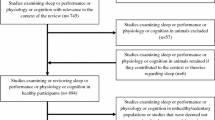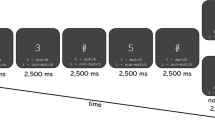Abstract
This study examined the effects of two short physical training programs on various parameters of heart rate variability (HRV) and on executive performance in older people. Twenty-four sedentary men and women aged 65–78 years were randomly assigned to an aerobic exercise program or a stretching program three times a week for 12 weeks. Resting HRV was measured in time and frequency domains in each participant before and after the 12-week programs. Executive performance was measured with the Wisconsin card sorting test (WCST). Significant group–session interactions emerged for the standard deviation of normal beat-to-beat (R–R) intervals, the root-mean-square of successive R–R, and high frequency power. Only the aerobic training group increased vagal-mediated HRV parameters. Moreover, only the participants in the aerobic training group improved their performance on the WCST. These results highlight the role of aerobic exercise as an important cardiac and brain protective factor, and suggest a direct link between exercise, HRV, and cognition in the aged population.

Similar content being viewed by others
References
Berntson GG, Bigger JT, Eckberg DL, Grossman P, Kaufmann PG, Malik M, Nagaraja HN, Porges SW, Saul JP, Stone PH, VanderMolen MW (1997) Heart rate variability: origins, methods, and interpretive caveats. Psychophysiology 34:623–648
Boutcher SH, Meyer BJ, Craig GA, Astheimer L (1998) Resting autonomic function in aerobically trained and untrained postmenopausal women. J Aging Phys Act 6:310–316
Brown AD, McMorris CA, Longman RS, Leigh R, Hill MD, Friedenreich CM, Poulin MJ (2008) Effects of cardiorespiratory fitness and cerebral blood flow on cognitive outcomes in older women. Neurobiol Aging. doi:10.1016/j.neurobiolaging.2008.11.002
Buchheit M, Simon C, Viola AU, Doutreleau S, Piquard F, Brandenberger G (2004) Heart rate variability in sportive elderly: relationship with daily physical activity. Med Sci Sport Exer 36:601–605
Buchheit M, Simon C, Charloux A, Doutreleau S, Piquard F, Brandenberger G (2005) Heart rate variability and intensity of habitual physical activity in middle-aged persons. Med Sci Sport Exer 37:1530–1534
Cassirame J, Tordi N, Mourot L, Rakobowchuk M, Regnard J (2007) Using of new beat to beat recorder system for traditional analysis of heart rate variability. Sci Sport 22:238–242
Churchill JD, Galvez R, Colcombe S, Swain RA, Kramer AF, Greenough WT (2002) Exercise, experience and the aging brain. Neurobiol Aging 23:941–955
Cohen J (1988) Statistical power analysis for the behavioral sciences. Lawrence Erlbaum, Hillsdale
Colcombe S, Kramer AF (2003) Fitness effects on the cognitive function of older adults: a meta-analytic study. Psychol Sci 14:125–130
Colcombe SJ, Erickson KI, Raz N, Webb AG, Cohen NJ, McAuley E, Kramer AF (2003) Aerobic fitness reduces brain tissue loss in aging humans. J Gerontol A Biol Sci Med Sci 58:176–180
Colcombe SJ, Kramer AF, Erickson KI, Scalf P, McAuley E, Cohen NJ, Webb A, Jerome GJ, Marquez DX, Elavsky S (2004) Cardiovascular fitness, cortical plasticity, and aging. Proc Natl Acad Sci USA 101:3316–3321
Cotman CW, Berchtold NC (2002) Exercise: a behavioral intervention to enhance brain health and plasticity. Trends Neurosci 25:295–301
De Meersman RE, Stein PK (2007) Vagal modulation and aging. Biol Psychol 74:165–173
Etnier JL, Nowell PM, Landers DM, Sibley BA (2006) A meta-regression to examine the relationship between aerobic fitness and cognitive performance. Brain Res Rev 52:119–130
Forte R, De Vito G, Figura F (2003) Effects of dynamic resistance training on heart rate variability in healthy older women. Eur J Appl Physiol 89:85–89
Fristoe NM, Salthouse TA, Woodard JL (1997) Examination of age-related deficits on the Wisconsin card sorting test. Neuropsychology 11:428–436
Gamelin FX, Berthoin S, Bosquet L (2006) Validity of the polar S810 heart rate monitor to measure R-R intervals at rest. Med Sci Sports Exer 38:887–893
Gianaros PJ, Van Der Veen FM, Jennings JR (2004) Regional cerebral blood flow correlates with heart period and high-frequency heart period variability during working-memory tasks: Implications for the cortical and subcortical regulation of cardiac autonomic activity. Psychophysiology 41:521–530
Hansen AL, Johnsen BH, Thayer JE (2003) Vagal influence on working memory and attention. Int J Psychophysiol 48:263–274
Hansen AL, Johnsen BH, Sollers JJ, Stenvik K, Thayer JF (2004) Heart rate variability and its relation to prefrontal cognitive function: the effects of training and detraining. Eur J Appl Physiol 93:263–272
Jurca R, Church TS, Morss GM, Jordan AN, Earnest CP (2004) Eight weeks of moderate-intensity exercise training increases heart rate variability in sedentary postmenopausal women. Am Heart J 147:e8–e15
Kim DH, Lipsitz LA, Ferrucci L, Varadhan R, Guralnik JM, Carlson MC, Fleisher LA, Fried LP, Chaves PHM (2006) Association between reduced heart rate variability and cognitive impairment in older disabled women in the community: Women’s Health and Aging Study I. J Am Geriatr Soc 54:1751–1757
Kramer AF, Hahn S, Cohen NJ, Banich MT, McAuley E, Harrison CR, Chason J, Vakil E, Bardell L, Boileau RA, Colcombe A (1999) Ageing, fitness and neurocognitive function. Nature 400:418–419
Kramer AF, Hahn S, McAuley E, Cohen NJ, Banich MT, Harrison C, Chason J, Boileau RA, Bardell L, Colcombe A, Vakil E (2001) Exercise, aging, and cognition: healthy body, healthy mind? In: Rogers WA, Fisher AD (eds) Human factors interventions for the health care of older adults. Lawrence Erlbaum, Mahwah, pp 91–120
Kriska AM, Sandler RB, Cauley JA, Laporte RE, Hom DL, Pambianco G (1988) The assessment of historical physical-activity and its relation to adult bone parameters. Am J Epidemiol 127:1053–1063
Levy WC, Cerqueira MD, Harp GD, Johannessen KA, Abrass IB, Schwartz RS, Stratton JR (1998) Effect of endurance exercise training on heart rate variability at rest in healthy young and older men. Am J Cardiol 82:1236–1241
Liao DP, Barnes RW, Chambless LE, Simpson RJ, Sorlie P, Heiss G (1995) Age, race, and sex-differences in autonomic cardiac-function measured by spectral-analysis of heart-rate-variability—the Aric study. Am J Cardiol 76:906–912
Lu WA, Kuo CD (2003) The effect of Tai Chi Chuan on the autonomic nervous modulation in older persons. Med Sci Sport Exer 35:1972–1976
Nelson ME, Rejeski WJ, Blair SN, Duncan PW, Judge JO, King AC, Macera CA, Castaneda-Sceppa C (2007) Physical activity and public health in older adults: recommendation from the American College of Sports Medicine and the American Heart Association. Med Sci Sport Exer 39:1435–1445
Niskanen JP, Tarvainen MP, Ranta-Aho PO, Karjalainen PA (2004) Software for advanced HRV analysis. Comput Meth Prog Biomed 76:73–81
Pagani M, Montano N, Porta A, Malliani A, Abboud FM, Birkett C, Somers VK (1997) Relationship between spectral components of cardiovascular variabilities and direct measures of muscle sympathetic nerve activity in humans. Circulation 95:1441–1448
Park SK, Tucker KL, O’Neill MS, Sparrow D, Vokonas PS, Hu HW, Schwartz J (2009) Fruit, vegetable, and fish consumption and heart rate variability: the Veterans Administration Normative Aging Study. Am J Clin Nutr 89:778–786
Perini R, Fisher N, Veicsteinas A, Pendergast DR (2002) Aerobic training and cardiovascular responses at rest and during exercise in older men and women. Med Sci Sport Exer 34:700–708
Pichot V, Roche F, Denis C, Garet M, Duverney D, Costes F, Barthelemy JC (2005) Interval training in elderly men increases both heart rate variability and baroreflex activity. Clin Auton Res 15:107–115
Pomeranz B, Macaulay RJB, Caudill MA, Kutz I, Adam D, Gordon D, Kilborn KM, Barger AC, Shannon DC, Cohen RJ, Benson H (1985) Assessment of autonomic function in humans by heart-rate spectral-analysis. Am J Physiol 248:H151–H153
Rhodes MG (2004) Age-related differences in performance on the Wisconsin card sorting test: a meta-analytic review. Psychol Aging 19:482–494
Robert H, Casillas JM, Iskandar M, d’Athis P, Antoine D, Taha S, Didier V, Scaglioni G, Caillaux BX, Van Hoecke J (2004) The Dijon Physical Activity Score: reproducibility and correlation with exercise testing in healthy elderly subjects. Ann Readapt Med Phys 47:546–554
Shallice T, Burgess PW (1991) Deficits in strategy application following frontal-lobe damage in man. Brain 114:727–741
Stein PK, Barzilay JI, Chaves PHM, Mistretta SQ, Domitrovich PP, Gottdiener JS, Rich MW, Kleiger RE (2008) Novel measures of heart rate variability predict cardiovascular mortality in older adults independent of traditional cardiovascular risk factors: the Cardiovascular Health Study (CHS). J Cardiovasc Electr 19:1169–1174
TaskForce (1996) Heart rate variability: standards of measurement, physiological interpretation and clinical use. Task Force of the European Society of Cardiology and the North American Society of Pacing and Electrophysiology. Circulation 93:1043–1065
Thayer JF, Lane RD (2009) Claude Bernard and the heart-brain connection: further elaboration of a model of neurovisceral integration. Neurosci Biobehav Rev 33:81–88
Thayer JF, Hansen AL, Saus-Rose E, Johnsen BH (2009a) Heart rate variability, prefrontal neural function, and cognitive performance: the neurovisceral integration perspective on self-regulation, adaptation, and health. Ann Behav Med 37:141–153
Thayer JF, Sollers JJ, Labiner DM, Weinand M, Herring AM, Lane RD, Ahern GL (2009b) Age-related differences in prefrontal control of heart rate in humans: a pharmacological blockade study. Int J Psychophysiol 72:81–88
Verhaeghen P, Cerella J (2002) Aging, executive control, and attention: a review of meta-analyses. Neurosci Biobehav Rev 26:849–857
Verheyden B, Eijnde BO, Beckers F, Vanhees L, Aubert AE (2006) Low-dose exercise training does not influence cardiac autonomic control in healthy sedentary men aged 55–75 years. J Sport Sci 24:1137–1147
West RL (1996) An application of prefrontal cortex function theory to cognitive aging. Psychol Bull 120:272–292
Acknowledgments
This work was supported by grants from Région Poitou-Charentes (Contrat de Projets Etat-Region 2007-2013, Axis C: Developing regional excellence in the field of health, Program “Observatory and platform on ageing and handicap”) and the University of Poitiers Action Concertée Incitative J 811. The authors greatly thank A. Abou-Dest for technical assistance and the exercise trainers G. Amossé, S. Cousson, M. Jaffrenou, L. Pouquet, and P. Talbot. This study complies with the current laws of the country in which it was performed.
Conflict of interest statement
The authors declare that they have no conflict of interest.
Author information
Authors and Affiliations
Corresponding author
Additional information
Communicated by Susan Ward.
Rights and permissions
About this article
Cite this article
Albinet, C.T., Boucard, G., Bouquet, C.A. et al. Increased heart rate variability and executive performance after aerobic training in the elderly. Eur J Appl Physiol 109, 617–624 (2010). https://doi.org/10.1007/s00421-010-1393-y
Accepted:
Published:
Issue Date:
DOI: https://doi.org/10.1007/s00421-010-1393-y




